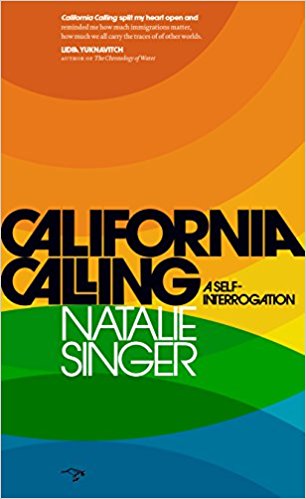 When I volunteered to write a review of Natalie Singer’s debut book, California Calling: A Self-Interrogation, I had one fear. What if I feel like the sad local girl California dumped in favor of this smarter, prettier, Canadian import? I wanted to be bigger than this. Sure, I did, but I still marked my territory by noting, in the email to her publisher, I’m fifth generation Californian.
When I volunteered to write a review of Natalie Singer’s debut book, California Calling: A Self-Interrogation, I had one fear. What if I feel like the sad local girl California dumped in favor of this smarter, prettier, Canadian import? I wanted to be bigger than this. Sure, I did, but I still marked my territory by noting, in the email to her publisher, I’m fifth generation Californian.
Then the advance review copy arrived.
I’m supposed to be shopping for gifts, but instead I’m holding this gorgeous book in my hands, devouring the micro essays that stitch together a story of a young woman falling in love with my home state.
Wow, she’s brilliant, I think as I turn another page.
So, let’s consider the plot line: She pulls a book off a library shelf. She dreams of California. She has parents. Divorce. She moves to the Bay Area. Goes to college. Has boyfriends. Sometimes they go on hikes or sail. She’s a nanny for a while. Writes for newspapers. There are lizards. The radio plays.
This is the story, but it’s also not the story. California Calling is the longing to belong. It’s the struggle to feel real in a place famous for its fictions. It’s the sting of otherness. Jewishness. Loneliness. How to make people feel welcome. Or not.
I read memoirs to feel connection, to see how other writers navigate between their changing identities. I want to simultaneously occupy the author’s recalled world while inhabiting the geography of my own memories. California Calling gives me all this and much more.
I love the book’s craft, how its hybrid form brought me the story in bits. Reading each tiny chapter, I sensed how Singer stalked stories. I felt brought along to serve as witness. Some chapters are factual nuggets about Yosemite rock falls, desert pup fish or the phallic Coit Tower. (It’s a fire nozzle! I hear my firefighter spouse holler from another room.) Point of view shifts throughout. I peek over Singer’s shoulder at Her-Then. Or she turns to face me, and I become You. Other times, the You becomes an ex-boyfriend. Or she sits with me on a cozy couch handing me aphorisms like See’s Candies: “Silence is a disappearance…Interrogation is a taking possession of one’s being…your loneliness finds corroboration in nature…one of the most valuable responses to trauma is testimony.” Space contracts and expands, from discomforting intimacy (really, Natalie, this boat privy is too small for both of us while you masturbate) to a remote aerial perspective above pine forests as we look for the spot where a girl once crossed over into California. As an infrequent quilter, I admire the deftness with which Singer threads together the pieces, some just a single sentence—“I wanted to be reconstituted”—to create a cohesive picture of a woman becoming Californian.
The book is packed with delicious language, and I lost count of how many times I read simply to savor a sentence’s flavorful landscape. Long ago, I went camping in Arizona with another teacher and two carloads of teenagers. Not a mom yet but more maternal than the guy, I suggested we feed the kids after a full day of hiking around Wupatki ruins. “Who needs food?” he said, sniffing the wind that blew across the red rock terrain. “You can eat the air.” I ate the air on every page of California Calling, delightfully familiar California coastal-fog-saturated salt air. My iodine levels rose reading this book.
I love California Calling for all its references, from Rocky Horror Picture Show to Bella in Twilight to Mary Austin’s Land of Little Rain. They felt like safe invitations into a woman’s busy mind, a woman who built a life from her ability to connect rather than disassemble—a mind occupied with assimilation, immigration, and belonging.
I rarely read books twice. There are just too many books on earth and I’m a slow reader. With California Calling, I want to do the thing my daughter does with television shows she loves. She binge-watches every season and the moment she comes to the end, she starts from the beginning again. Like chain smoking stories, I need to finish up my gift list, maybe shower and change my clothes. Then I’ll light the beginning of this book with the hot ember of its ending. As Singer writes: “If our childhood truths were really fictions, to begin again all we must do to grow up is make more space for myth.” So, what’s this book about? Beginning again.
___
Rebecca Fish Ewan, founder of Plankton Press (where small is big enough), creates Tiny Joys & GRAPH(feeties) zines. She has degrees in math, landscape architecture, and creative writing and is a writer/poet/cartoonist. She teaches in The Design School at Arizona State University and lives with her family in Tempe. Her work has appeared in Bikequity, Brevity, Femme Fotale, Hip Mama, Mutha, Punctuate, Survivor Zine, and Under the Gum Tree. She has two creative nonfiction books: A Land Between, an ecocultural history of the Owens Valley, and By the Forces of Gravity, a forthcoming memoir of cartoons and verse (Books by Hippocampus, June 2018).
